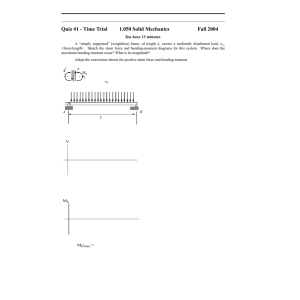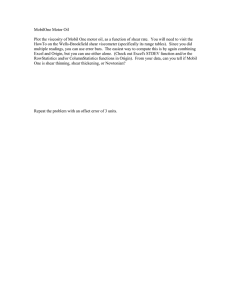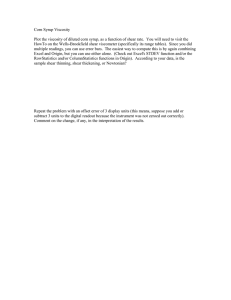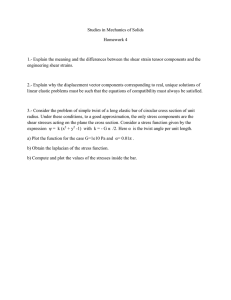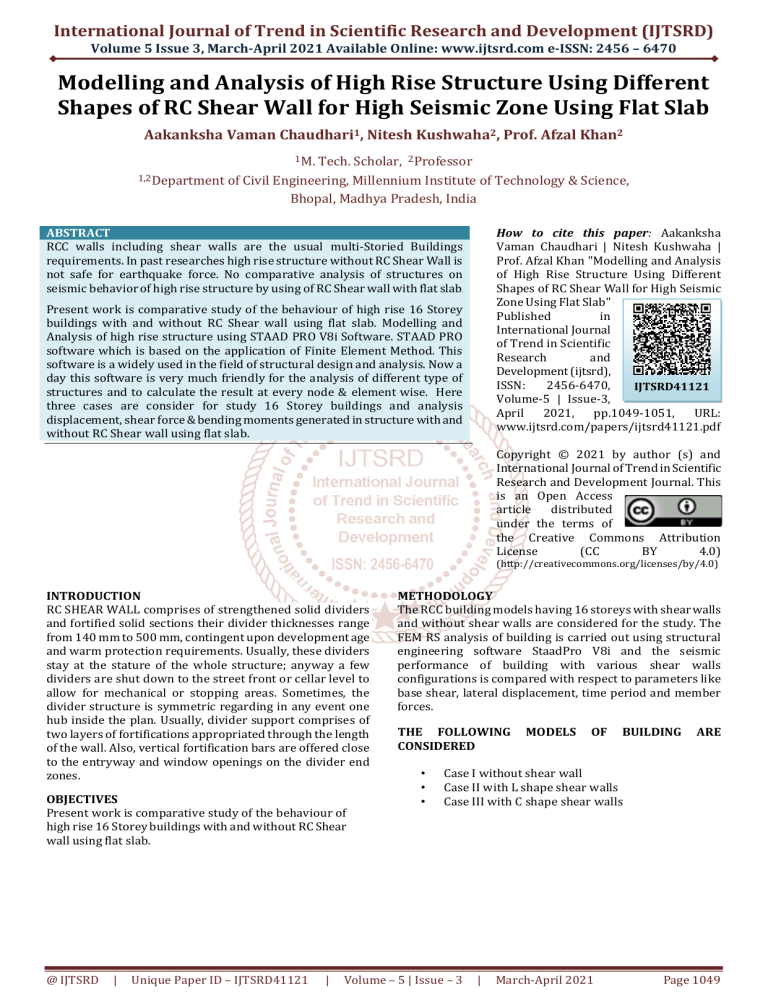
International Journal of Trend in Scientific Research and Development (IJTSRD)
Volume 5 Issue 3, March-April 2021 Available Online: www.ijtsrd.com e-ISSN: 2456 – 6470
Modelling and Analysis of High Rise Structure Using Different
Shapes of RC Shear Wall for High Seismic Zone Using Flat Slab
Aakanksha Vaman Chaudhari1, Nitesh Kushwaha2, Prof. Afzal Khan2
1M.
Tech. Scholar, 2Professor
1,2Department of Civil Engineering, Millennium Institute of Technology & Science,
Bhopal, Madhya Pradesh, India
ABSTRACT
RCC walls including shear walls are the usual multi-Storied Buildings
requirements. In past researches high rise structure without RC Shear Wall is
not safe for earthquake force. No comparative analysis of structures on
seismic behavior of high rise structure by using of RC Shear wall with flat slab.
How to cite this paper: Aakanksha
Vaman Chaudhari | Nitesh Kushwaha |
Prof. Afzal Khan "Modelling and Analysis
of High Rise Structure Using Different
Shapes of RC Shear Wall for High Seismic
Zone Using Flat Slab"
Published
in
International Journal
of Trend in Scientific
Research
and
Development (ijtsrd),
ISSN:
2456-6470,
IJTSRD41121
Volume-5 | Issue-3,
April
2021,
pp.1049-1051,
URL:
www.ijtsrd.com/papers/ijtsrd41121.pdf
Present work is comparative study of the behaviour of high rise 16 Storey
buildings with and without RC Shear wall using flat slab. Modelling and
Analysis of high rise structure using STAAD PRO V8i Software. STAAD PRO
software which is based on the application of Finite Element Method. This
software is a widely used in the field of structural design and analysis. Now a
day this software is very much friendly for the analysis of different type of
structures and to calculate the result at every node & element wise. Here
three cases are consider for study 16 Storey buildings and analysis
displacement, shear force & bending moments generated in structure with and
without RC Shear wall using flat slab.
Copyright © 2021 by author (s) and
International Journal of Trend in Scientific
Research and Development Journal. This
is an Open Access
article
distributed
under the terms of
the Creative Commons Attribution
License
(CC
BY
4.0)
(http://creativecommons.org/licenses/by/4.0)
INTRODUCTION
RC SHEAR WALL comprises of strengthened solid dividers
and fortified solid sections their divider thicknesses range
from 140 mm to 500 mm, contingent upon development age
and warm protection requirements. Usually, these dividers
stay at the stature of the whole structure; anyway a few
dividers are shut down to the street front or cellar level to
allow for mechanical or stopping areas. Sometimes, the
divider structure is symmetric regarding in any event one
hub inside the plan. Usually, divider support comprises of
two layers of fortifications appropriated through the length
of the wall. Also, vertical fortification bars are offered close
to the entryway and window openings on the divider end
zones.
OBJECTIVES
Present work is comparative study of the behaviour of
high rise 16 Storey buildings with and without RC Shear
wall using flat slab.
@ IJTSRD
|
Unique Paper ID – IJTSRD41121
|
METHODOLOGY
The RCC building models having 16 storeys with shear walls
and without shear walls are considered for the study. The
FEM RS analysis of building is carried out using structural
engineering software StaadPro V8i and the seismic
performance of building with various shear walls
configurations is compared with respect to parameters like
base shear, lateral displacement, time period and member
forces.
THE FOLLOWING
CONSIDERED
•
•
•
MODELS
OF
BUILDING
ARE
Case I without shear wall
Case II with L shape shear walls
Case III with C shape shear walls
Volume – 5 | Issue – 3
|
March-April 2021
Page 1049
International Journal of Trend in Scientific Research and Development (IJTSRD) @ www.ijtsrd.com eISSN: 2456-6470
Results
Shear force results for high rise structure
Table 1: Shear force results for high rise structure
Models
Shear force (KN)Zone = IV
Max Fy (in kN)
Case I
37.9
Case II
58.2
Case III
66.2
Models
Shear force (KN)Zone = IV
Min Fy (in kN)
Case I
-37.9
Case II
-215.1
Case III
-278.2
Models
Shear force (KN)Zone = IV
Max Fz (in kN)
Fig. 1: Building without RC shear wall
Case I
12.0
Case II
113.6
Case III
156.9
Models
Shear force (KN)Zone = IV
Min Fz (in kN)
Case I
-12.0
Case II
-315.4
Case III
285.6
It is observed that maximum shear forces are seen in CaseIII
for zoneIV. From all the models, Case II shown min shear
forces.
Table 2: Bending moment results for high rise structure
MODELS
Bending moment (KNm)
Fig. 2: Building with L shape RC shear wall
Max Mx
Min Mx
Max My
Min My
Max Mz
Min Fz
(in kNm) (in kNm) (in kNm) (in kNm) (in kNm) (in kN)
Case I
9.93
-9.93
216.6
-216.6
771.1
-284.1
Case II
114.26 -84.23 1141.24 -742.3 2023.11 -684.1
Case III
87.21 -110.14 745.34 -671.6 1013.58 -842.3
Fig. 3: Bending moment results for high rise structure
@ IJTSRD
|
Unique Paper ID – IJTSRD41121
|
Volume – 5 | Issue – 3
|
March-April 2021
Page 1050
International Journal of Trend in Scientific Research and Development (IJTSRD) @ www.ijtsrd.com eISSN: 2456-6470
It is observed that maximum bending moments are seen in
case 2 for zone IV. From all the models, Case II shown min
shear forces for zone 4.
framed buildings with shear wall.” Journal of
Scientific & Engineering Research, Volume 4, Issue 1.
[7]
SoundariyaTumane, Vinay Mehta(2018), A Study on
Time History Analysis of High Rise Building with Infill
Panels, International Journal for Research in Applied
Science & Engineering Technology, Volume 6 Issue 6,
369-378.
[8]
Sumanth G, Mr.Vasantha.D(2016), Comparative
Seismic Behaviour Analysis Of Structure With Shear
Wall At Different Locations, International Research
Journal of Engineering and Technology, Volume: 03
Issue: 08,413-419.
[9]
SunilkumarKalyani, Vishwanath.B.Patil (2015),Effect
of Shear Wall Sections on Multistorey Building with
Satellite Bus-Stop having Floating Columns with Top
Soft Storey , International Journal for Innovative
Research in Science & Technology, Volume 2, Issue
02,pp. 169-174.
[10]
T. Gouthami , Dr. K. Rajashekar(2017), The Behaviour
of Shear Wall of High-Rise Building, Under Seismic
Load by Adopting Linear Dynamic Analysis,
International Journal of Scientific Engineering and
Technology Research, Vol.06, Issue 31, 1-6.
[11]
Ravi Kumar K. Sundar Kumar "Analysis and Design of
Shear Wall for an Earthquake Resistant Building using
ETABS"International Journal for Innovative Research
in Science & Technology, Volume 4 , Issue 5, October
2017
Tarun shrivastava, Anubhav Rai, Prof. Yogesh Kumar
Bajpai (2013), “Effectiveness of shear wall-frame
structure subjected to wind loading in multi-storey
building.” International Journal of Computational
Engineering Research, Vol.5.
[12]
S K Hirde ,N K Shelar (2016), Effect of Positioning of
RC Shear Walls on Seismic Performance of Buildings
Resting on Plain and Sloping Ground, International
Journal of Current Engineering and Technology, Vol.5,
No.3, 1659- 1665.
Tarunshrivastava, Prof.Anubhav Rai, Prof. Yogesh
Kumar Bajpai (2015), “Effectiveness of shear wallframe structure subjected to wind loading in multistorey building.” International Journal of
Computational Engineering Research, Vol.5.
[13]
Tsonos AG, Tegos IA, Penelis GGr. “Seismic resistance
of type 2 exterior beam-column joints reinforced with
inclined bars, ACI structuraljournal, 89,. 3-12,1992.
CONCLUSION
The Minimum Nodal deflection results for high
rise structure in Case I II and III is respectively
Min Y 2.38, 3.24 and 3.98.
The Minimum Nodal deflection results for high
rise structure in Case I II and III is respectively
Min X -0.076, -0.116 and -0.127.
The maximum Nodal deflection results for high
rise structure in Case I II and III is respectively
Max Y -12.06, -34.71 and -12.06.
It is observed that maximum shear forces are seen
in Case III for zone IV. From all the models, Case II
shown min shear forces.
All the models with shear walls have approximately
60% less time period as compared with Case II has
minimum time period.
REFERENCES:
[1] Qiuhong ZHAO, Abolhassan Astaneh -ASL ," Cyclic
Behaviour of traditional and innovative composite
shear walls" 13th World Conference on Earthquake
Engineering
[2]
[3]
[4]
S. P. Sharma, J. P. Bhandar(2015), Literature Review
on the Seismic Performance of Multi-Storey Building
with Different Locations of Shear Wall and Diagrid,
International Journal of Science and Research, Volume
6 Issue 6, 583-590.
[14]
Ugale Ashish B. and Raut Harshlata R," Effect of steel
plate shear wall on behavior of structure"
International Journal of civil Engineering Research.
ISSN 2278-3652 Volume5, Number 3(2014)pp 295300. [7].
[5]
Shahabodin. Zaregairizi,"Comparative investigation
on using shear wall and infill to improve seismic
performance of existing buildings", 14th World
Conference on Earthquake Engineering.
[15]
[6]
Shaik Kamal Mohammed Azam, Vinod Hosur (2013),
“Seismic performance evaluation of multistoried RC
Varsha. R. Harne "Comparative study of strength of
RC Shear wall at different location on multistoried
Residential building", International Journal of civil
Engineering
Research.
ISSN
2278-3652
Volume5,Number 4(2014)pp 391-400.
@ IJTSRD
|
Unique Paper ID – IJTSRD41121
|
Volume – 5 | Issue – 3
|
March-April 2021
Page 1051

